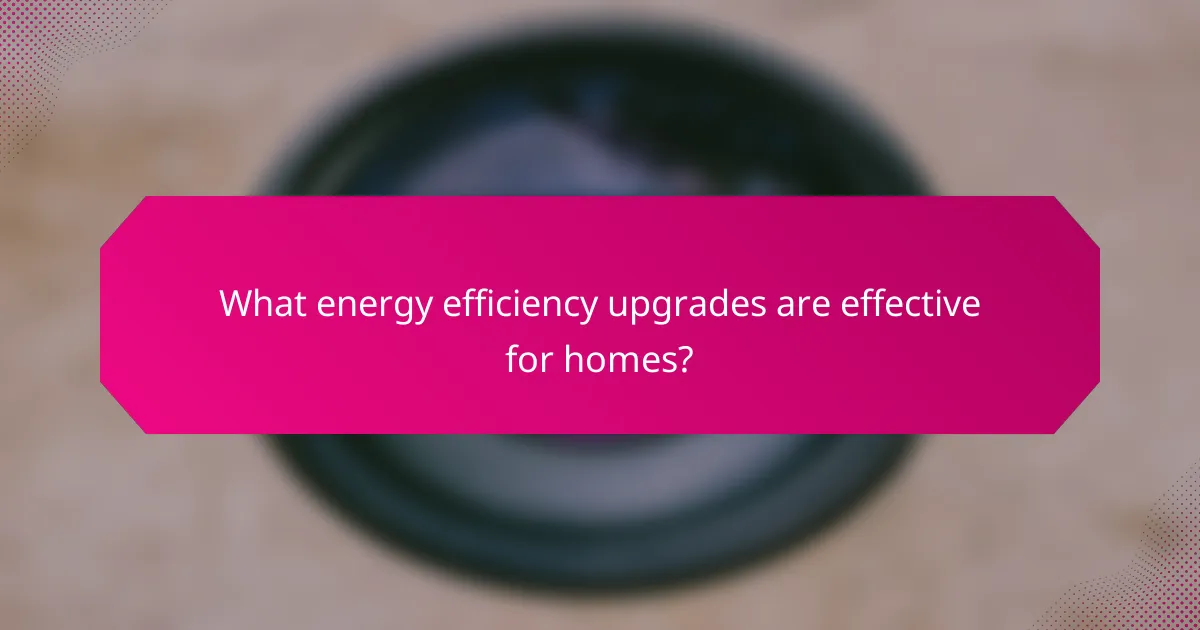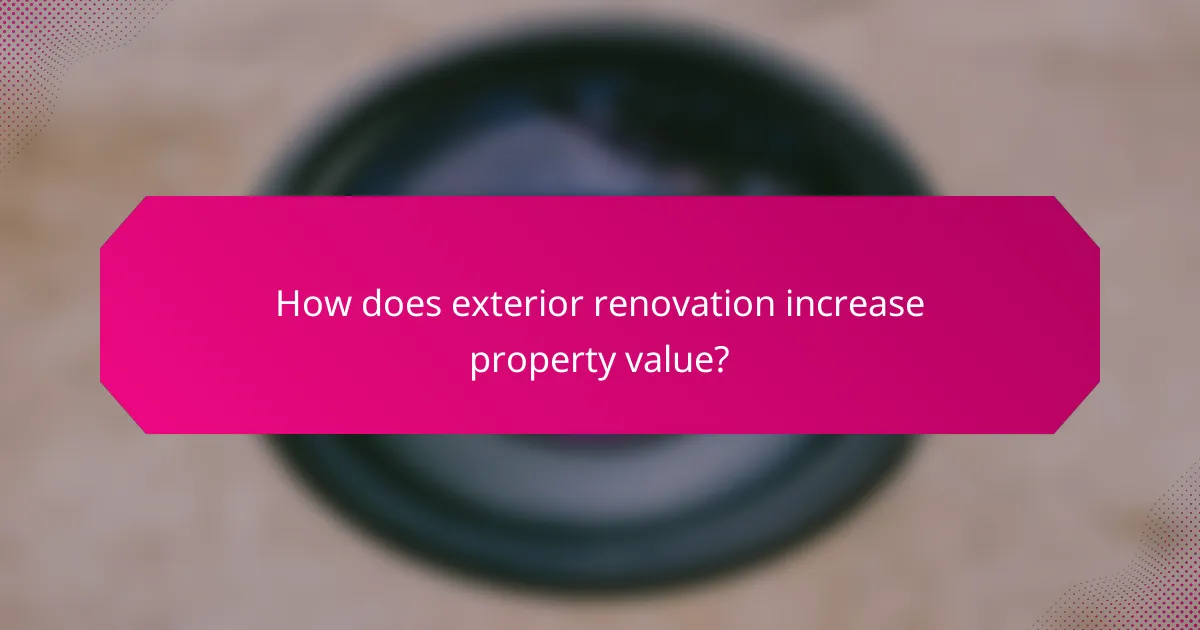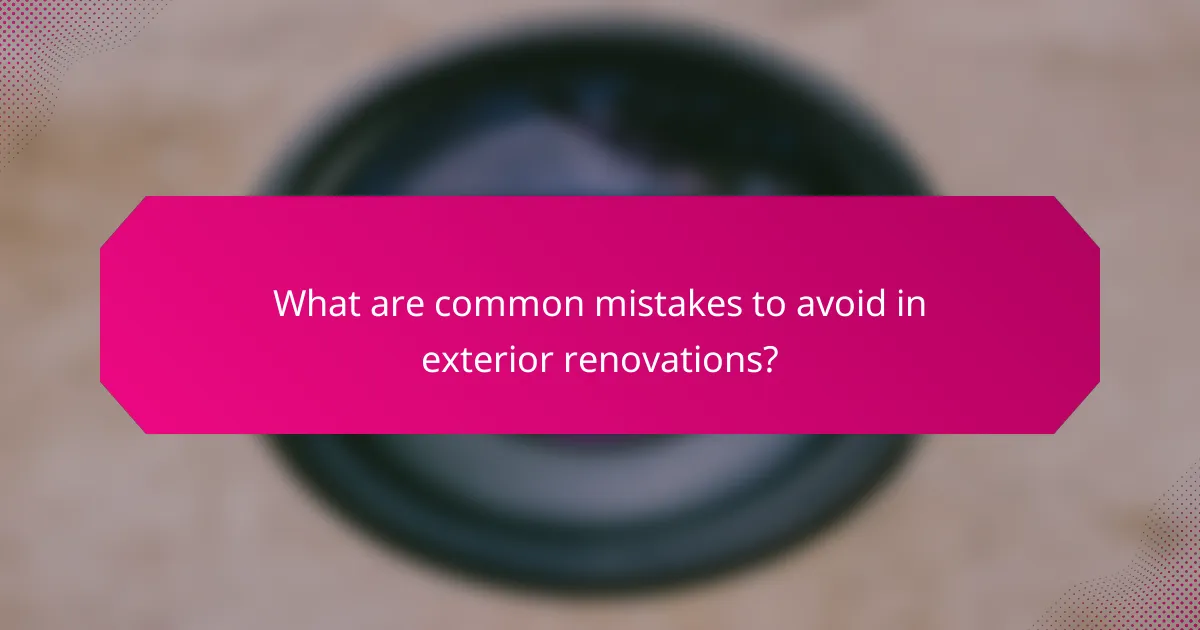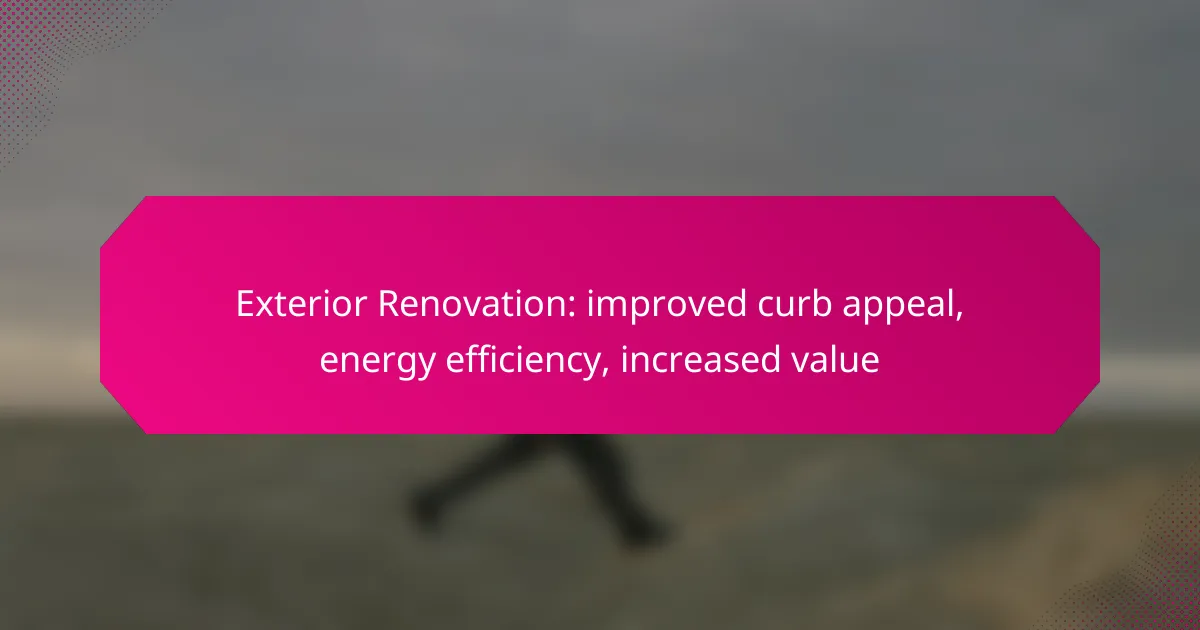Exterior renovation plays a crucial role in boosting a property’s curb appeal, making it more inviting to potential buyers and enhancing its overall value. By incorporating improvements like fresh paint, modern fixtures, and energy-efficient upgrades, homeowners can create a visually appealing and comfortable environment while also increasing energy efficiency and market value.

How can exterior renovation improve curb appeal in the UK?
Exterior renovation can significantly enhance curb appeal by updating the visual aspects of a property, making it more attractive to potential buyers and passersby. Improvements such as landscaping, fresh paint, and modern fixtures can create a welcoming atmosphere while increasing the overall value of the home.
Landscaping enhancements
Landscaping enhancements can dramatically transform the exterior of a home. Simple upgrades like planting colorful flowers, maintaining a well-manicured lawn, and adding decorative elements such as garden paths or stone borders can create a vibrant and inviting appearance.
Consider incorporating native plants that require less maintenance and are more suited to the local climate. Regular upkeep, such as trimming hedges and mowing the lawn, will ensure that your landscaping remains appealing year-round.
Exterior painting
Fresh exterior paint can rejuvenate a home’s look and protect it from the elements. Choosing a modern color palette that complements the architectural style can enhance visual appeal and attract attention.
When selecting paint, opt for high-quality, weather-resistant options suitable for the UK climate. A well-executed paint job can last several years, making it a worthwhile investment for improving curb appeal.
New front door installation
Installing a new front door can serve as a focal point for your home’s exterior, providing both aesthetic and functional benefits. A stylish door can enhance the overall design while improving security and energy efficiency.
Consider materials like fiberglass or steel for durability and insulation. Choose colors and styles that harmonize with the rest of the home to create a cohesive look that stands out.
Window upgrades
Upgrading windows can significantly improve curb appeal and energy efficiency. New windows not only enhance the aesthetic of your home but also reduce energy costs by providing better insulation.
Look for double or triple-glazed options that meet UK energy efficiency standards. Choosing styles that match the architectural character of your home will ensure that the upgrades are both functional and visually appealing.
Driveway resurfacing
Resurfacing a driveway can enhance the first impression of your home. Options like block paving, resin-bound surfaces, or decorative concrete can create a polished look that complements your property’s exterior.
When selecting a resurfacing option, consider durability, maintenance, and how well it fits with your home’s style. Regular maintenance, such as sealing and cleaning, will help keep the driveway looking fresh and inviting.

What energy efficiency upgrades are effective for homes?
Effective energy efficiency upgrades for homes include insulation installation, energy-efficient windows, solar panel integration, and high-efficiency HVAC systems. These improvements not only reduce energy consumption but also enhance comfort and can increase property value.
Insulation installation
Insulation installation is crucial for maintaining a comfortable indoor temperature and reducing energy costs. By properly insulating walls, attics, and basements, homes can minimize heat loss in winter and keep cool air inside during summer.
Consider using materials like fiberglass, foam board, or spray foam, which have different R-values indicating their effectiveness. A well-insulated home can save homeowners a significant percentage on heating and cooling bills.
Energy-efficient windows
Energy-efficient windows help reduce heat transfer and improve overall home comfort. Look for windows with double or triple glazing, low-emissivity (Low-E) coatings, and gas fills like argon or krypton for better insulation.
Replacing old windows can lead to energy savings of around 10-25%. Additionally, many regions offer tax credits or rebates for upgrading to energy-efficient models, making this investment even more appealing.
Solar panel integration
Solar panel integration allows homeowners to harness renewable energy, reducing reliance on the grid and lowering electricity bills. Depending on the system size and local sunlight exposure, solar panels can provide a significant portion of a home’s energy needs.
Consider local incentives, such as tax credits or net metering programs, which can enhance the financial viability of solar installations. A typical payback period for solar panels ranges from 5 to 10 years, depending on energy costs and installation expenses.
High-efficiency HVAC systems
High-efficiency HVAC systems are designed to use less energy while providing effective heating and cooling. Look for systems with a high Seasonal Energy Efficiency Ratio (SEER) for air conditioning and Annual Fuel Utilization Efficiency (AFUE) ratings for heating units.
Upgrading to a high-efficiency HVAC system can reduce energy consumption by 20-50%. Regular maintenance, such as changing filters and scheduling annual inspections, is essential to keep these systems operating efficiently.

How does exterior renovation increase property value?
Exterior renovation can significantly enhance property value by improving aesthetics, energy efficiency, and overall appeal. Upgrades such as new siding, roofing, and landscaping not only attract potential buyers but also contribute to a higher market price.
Return on investment statistics
Investing in exterior renovations typically yields a strong return on investment (ROI). Homeowners can expect to recoup approximately 70% to 90% of their renovation costs, depending on the type of improvement. For instance, replacing siding or adding a new front door often ranks among the highest in ROI.
According to various studies, projects like window replacements and deck additions can also provide significant returns, often exceeding 75%. These improvements enhance both functionality and visual appeal, making properties more attractive to buyers.
Market trends in the UK
In the UK, the demand for energy-efficient homes is rising, with many buyers prioritizing sustainability. Renovations that improve energy efficiency, such as installing double-glazed windows or better insulation, can increase property value by appealing to environmentally conscious buyers.
Additionally, the trend towards modern aesthetics means that properties with updated exteriors are more likely to sell quickly and at higher prices. Homeowners should consider local preferences and styles when planning renovations to align with market demands.
Impact of curb appeal on sales
Curb appeal plays a crucial role in the home buying process, as first impressions can significantly influence buyer decisions. Properties with well-maintained exteriors, attractive landscaping, and fresh paint are more likely to attract potential buyers and can sell for higher prices.
Research indicates that homes with high curb appeal can sell for up to 10% more than similar properties with less attractive exteriors. Simple enhancements, such as a clean entryway or well-kept gardens, can make a substantial difference in how quickly a home sells and at what price.

What are the prerequisites for a successful exterior renovation?
Successful exterior renovation requires careful planning, adherence to local regulations, and the selection of a trustworthy contractor. By addressing these prerequisites, homeowners can enhance curb appeal, improve energy efficiency, and increase property value effectively.
Budget planning
Establishing a clear budget is essential for any exterior renovation project. Consider costs for materials, labor, permits, and unexpected expenses, which can typically range from 10% to 20% of the total budget. A well-defined budget helps prioritize renovations that offer the best return on investment.
To manage your budget effectively, create a detailed list of all anticipated expenses and compare quotes from multiple suppliers and contractors. This approach can help identify cost-saving opportunities without compromising quality.
Permitting requirements
Before starting an exterior renovation, check local permitting requirements to ensure compliance with building codes. Depending on the scope of your project, you may need permits for structural changes, electrical work, or plumbing updates. Failing to secure the necessary permits can lead to fines or the need to redo work.
Contact your local building department or visit their website to understand the specific permits required for your renovation. This step is crucial for avoiding delays and ensuring that your project meets safety and zoning regulations.
Choosing a reliable contractor
Selecting a reliable contractor is vital for the success of your exterior renovation. Look for professionals with good reviews, relevant experience, and proper licensing and insurance. Asking for referrals from friends or family can also help you find trustworthy candidates.
When interviewing potential contractors, request detailed estimates and timelines. Ensure they provide a clear contract outlining the scope of work, payment schedule, and warranty information. This transparency helps prevent misunderstandings and keeps the project on track.

Which materials are best for exterior renovations?
Choosing the right materials for exterior renovations is crucial for enhancing curb appeal, improving energy efficiency, and increasing property value. Key considerations include durability, maintenance requirements, and aesthetic appeal.
Composite decking
Composite decking is a popular choice for outdoor spaces due to its blend of wood fibers and recycled plastic, offering durability and low maintenance. Unlike traditional wood, it resists rot, splintering, and insect damage, making it ideal for various climates.
When selecting composite decking, consider the color and texture options available. Many brands offer warranties ranging from 20 to 30 years, ensuring long-term performance. Additionally, composite materials can help improve energy efficiency by providing better insulation compared to wood.
Vinyl siding
Vinyl siding is a cost-effective and versatile option for exterior renovations, known for its durability and low upkeep. It comes in a wide variety of colors and styles, allowing homeowners to achieve the desired aesthetic without frequent painting or repairs.
When choosing vinyl siding, look for products with a high insulation value, as this can enhance energy efficiency. Additionally, ensure that the siding meets local building codes and is installed correctly to avoid issues such as warping or fading over time.
Brick vs. stucco
Brick and stucco are two popular materials for home exteriors, each with distinct advantages. Brick offers a classic look, exceptional durability, and low maintenance, while stucco provides a more modern appearance and can be applied in various textures and colors.
Consider the climate when choosing between brick and stucco. Brick performs well in wet conditions, while stucco can crack in extreme temperatures if not properly installed. Both materials can enhance energy efficiency, but brick typically has a higher initial cost compared to stucco. Evaluate your budget and aesthetic preferences to make the best choice for your renovation project.

What are common mistakes to avoid in exterior renovations?
Common mistakes in exterior renovations include neglecting proper planning, overlooking local regulations, and failing to consider energy efficiency. Avoiding these pitfalls can enhance curb appeal, boost energy efficiency, and increase property value.
Neglecting proper planning
Failing to plan adequately can lead to costly errors and delays. Start by setting a clear budget and timeline, and outline the specific renovations you want to undertake. This will help you stay organized and focused throughout the project.
Additionally, consider the overall design and how each element will work together. For example, if you’re updating siding, ensure it complements your roof and windows. A cohesive look enhances curb appeal and can increase your home’s value.
Overlooking local regulations
Many homeowners forget to check local building codes and regulations before starting renovations. This can result in fines or the need to redo work that doesn’t meet standards. Always consult your local authorities or a professional to understand what permits are necessary.
For instance, if you live in an area with strict zoning laws, you may need approval for changes to your home’s exterior. Ignoring these rules can lead to complications down the line, so it’s best to be informed from the start.
Failing to consider energy efficiency
Energy efficiency is often overlooked during exterior renovations, yet it can significantly impact your utility bills and the environment. When replacing windows or doors, opt for energy-efficient models that can reduce heating and cooling costs.
Additionally, consider adding insulation or using reflective roofing materials. These improvements not only enhance comfort but can also qualify you for local energy rebates, making them a smart financial choice.
